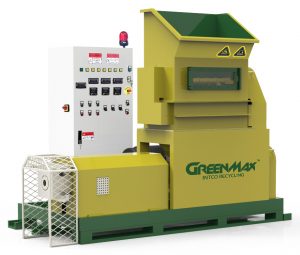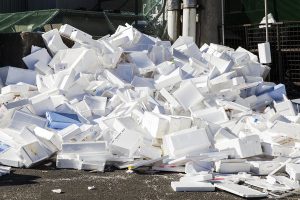A package of equipment from New Jersey-based Foam Cycle aims to help organizations, including municipalities, with their expanded polystyrene (EPS) recycling efforts.

A package of equipment from New Jersey-based Foam Cycle aims to help organizations, including municipalities, with their expanded polystyrene (EPS) recycling efforts.
 A densifier innovation aims to boost the cost-effectiveness of transporting EPS plastic for recycling. Continue Reading
A densifier innovation aims to boost the cost-effectiveness of transporting EPS plastic for recycling. Continue Reading
 Major brands fund a recycling outreach campaign to thousands of students, and prices increase for recovered PET and HDPE.
Major brands fund a recycling outreach campaign to thousands of students, and prices increase for recovered PET and HDPE.
 The extended producer responsibility program for packaging in Portugal has seen improving recovery volumes in recent years.
The extended producer responsibility program for packaging in Portugal has seen improving recovery volumes in recent years.
 A major newspaper calls for the most-populous U.S. state to ban EPS packaging, and a study finds toxic flame retardants end up in children’s toys made from recycled e-plastics.
A major newspaper calls for the most-populous U.S. state to ban EPS packaging, and a study finds toxic flame retardants end up in children’s toys made from recycled e-plastics.
An appeals court in New York has rejected an attempt by the New York City Department of Sanitation to restore a ban on expanded polystyrene food-service products. Continue Reading
 In the latest chapter of its ongoing expanded polystyrene saga, New York City will again ban foam food-service packaging. City officials have determined it “cannot be recycled in a manner that is economically feasible or environmentally effective.”
In the latest chapter of its ongoing expanded polystyrene saga, New York City will again ban foam food-service packaging. City officials have determined it “cannot be recycled in a manner that is economically feasible or environmentally effective.”
 South Africa recycled more total plastic in 2015 than the year before, but the country’s plastics diversion rate dropped and plastics recycling companies struggled.
South Africa recycled more total plastic in 2015 than the year before, but the country’s plastics diversion rate dropped and plastics recycling companies struggled.
 Shareholders of Target and other giant brands will likely decide whether they want the businesses to stop using expanded polystyrene.
Shareholders of Target and other giant brands will likely decide whether they want the businesses to stop using expanded polystyrene.
 A process of recycling expanded polystyrene for use as a filter medium was the subject of a recent TED talk. But the presenter was a bit younger than your typical plastics recycling executive.
A process of recycling expanded polystyrene for use as a filter medium was the subject of a recent TED talk. But the presenter was a bit younger than your typical plastics recycling executive.
